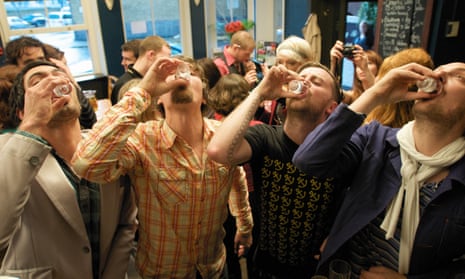You don’t need to spend much time adrift in the 21st-century mediascape to conclude that there is something seriously wrong with young people today. Millennials are more narcissistic, anxious, annoying, entitled, communist and fond of avocados than any generation ever; millennials are killing everything from mayonnaise to diamonds to the car industry; millennials are making everyone else feel bad; millennials – get this! – don’t even drink any more.
The figures just released by the Health Survey for England lend weight to what is becoming a familiar trope. In 2015, one in three 16- to 24-year-olds were completely teetotal, compared with one in five in 2005. Lifetime abstainers rose from 9% to 17%; meanwhile rates of harmful drinking have declined. In 2015, 28% admitted to drinking above the recommended limits; 10 years previously, it was 43%. The 10,000 participants reported that complete abstention was becoming “mainstream”.
What’s going on? Is Brett Kavanaugh not proof enough that a youthful enjoyment of beer is healthy, masculine, and fully compatible with appointment to the highest office? The alcohol industry is clearly spooked too: there are dark mutterings among insiders that drinking will go the way of smoking. I can think of no other reason for Diageo to foist its non-alcoholic gin Seedlip upon us.
In the absence of one overarching reason for the decline – and a widespread reluctance to ask some young people – commentators are free to choose their own moral panic. It can’t simply be that young people are making better choices.
Perhaps they’re all smoking weed? Only recreational drug use is also down. Perhaps they’re too busy having dead-eyed app-facilitated sex? Also on the decline, I’m afraid.
Multiculturalism appears to have something to do with it – longstanding English traditions of vomiting up Tyskie on village greens being supplanted by cultural practices that don’t revolve around booze. London, our most multicultural city, also has the highest proportion of non-drinkers in the country. There’s the social media argument: no one wants a compromising picture on Facebook. There’s the economic argument: alcohol is expensive. So is education. A lifetime of debt seems a high price to pay for a few nights out. And there’s the psychological argument: alcohol makes you lose control. When things already feel out of control, that’s less appealing.
It’s probably a little of all these things. But perhaps the most eye-catching explanation comes courtesy of the American psychologist Dr Jean Twenge, author of such parent-trolling books as The Narcissism Epidemic and Generation Me. In her latest opus, iGen, she correlates the decline of drinking with the widespread adoption of smartphones in 2007. It is in this year that you see the hardest drop-offs in drinking (also smoking, drug-taking, teen sex, etc) and a concomitant rise in mental health disorders. Smartphones push many of the same buttons as these traditional teenage signifiers – “rebellion”, “independence”, “community”, “regrettable choices” – and have ended up supplanting them. Twenge’s thesis is that today’s young people are physically safer but mentally much more imperilled.
One reason the theory works is that far from being an English phenomenon, the decline in drinking is global – as is the spread of smartphones. And far from being a young person phenomenon, drinking is actually on the decline across generations, across classes, across genders and across regions – as is the spread of smartphones. But you hear less about how thirtysomething men are also drinking less alcohol. Or fortysomething women.
I find that when you actually ask people why they’re giving up – or simply cutting down – their reasons are perfectly explicable. The hangovers became too much. They had been through a bad break-up and needed to pull themselves out of a downward spiral. They are Muslim. They realised how much they spent on alcohol. They were worried about their health. They never liked it all that much in the first place. Craft beer is whack. University campuses are dangerous places when you’re drunk.
I say drinking is on the decline across all demographics. There is one outlier group. Middle-aged men. These are now the problem drinkers, the ones who refuse to accept the risks, the ones who alcohol campaigners want to reach. But you don’t see so many alarmist headlines about them. Funny that.

